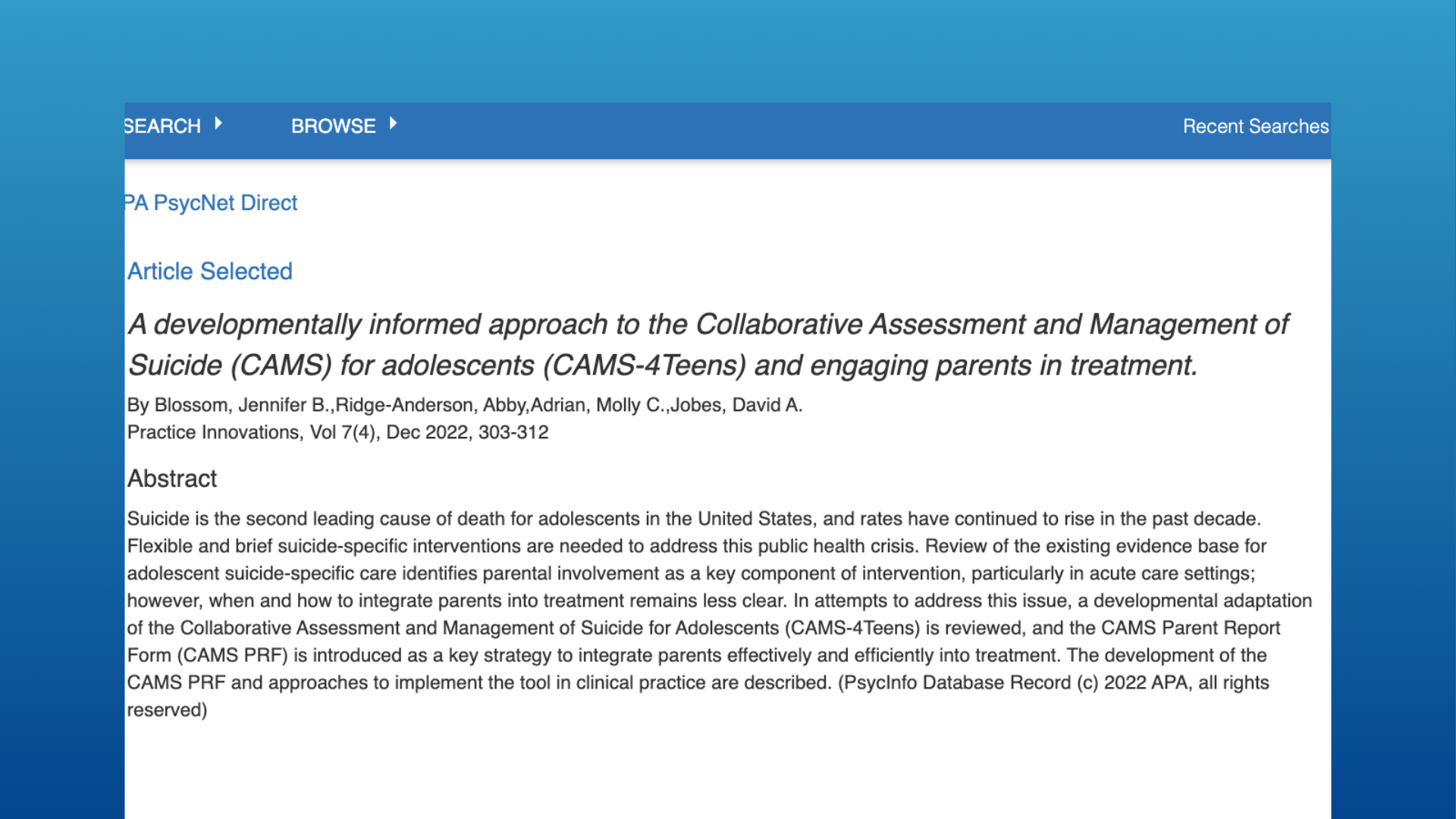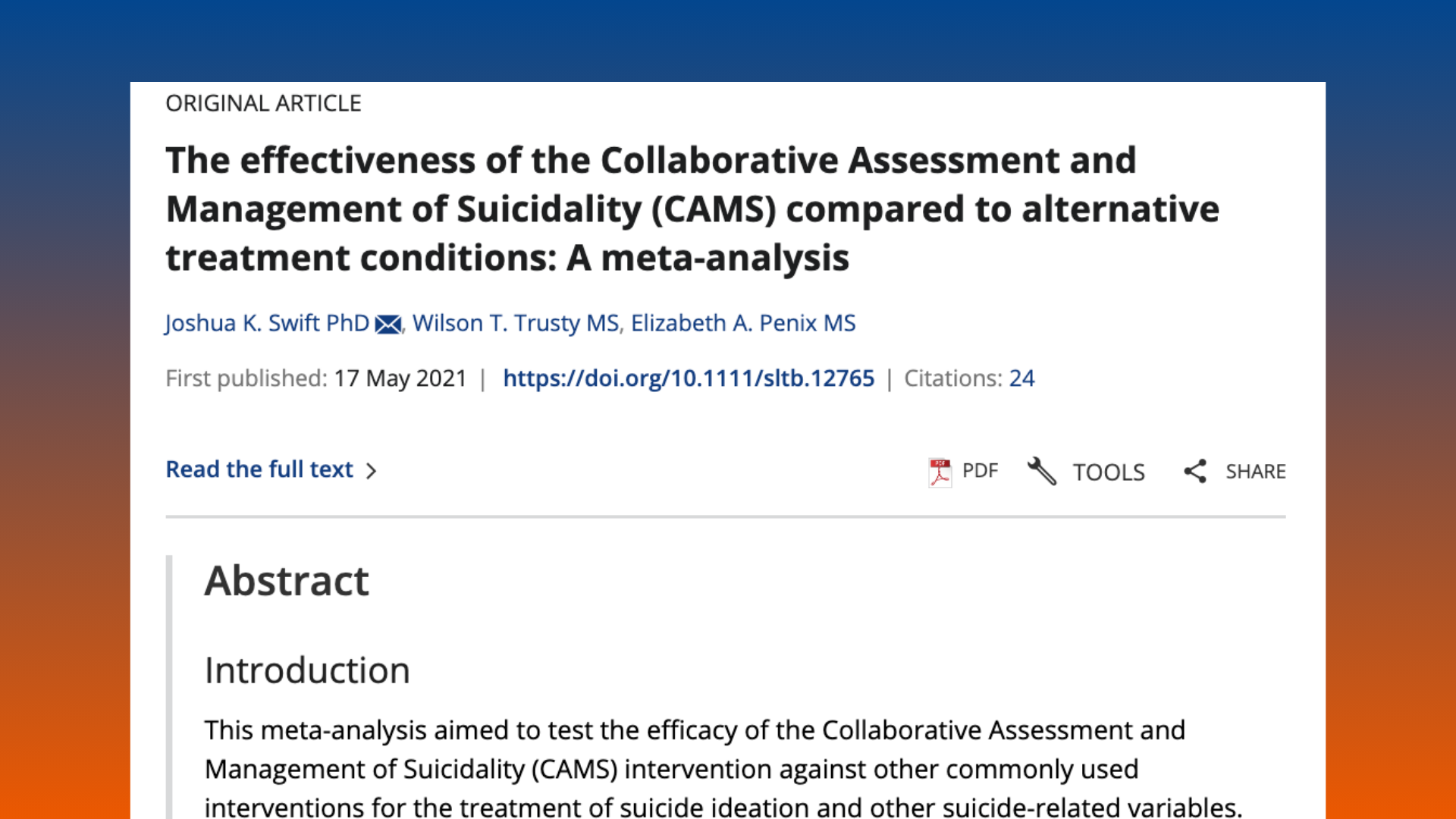
Become CAMS Trained™
Equip your clinicians with an evidence-based, collaborative, recovery-oriented, and suicide-specific treatment.
CAMS is an evidence-based suicide-specific treatment. Backed by 35 years of research, CAMS directly and collaboratively addresses suicide and its drivers and is proven to reduce suicidal ideation in as few as six sessions with a trained therapist.
Benefits of CAMS
Discover how CAMS training equips you with the tools to make a real difference in the lives of those struggling with suicide concerns
Increased Clinician Confidence and Skills
Gain the clarity and confidence to effectively treat suicide concerns with comprehensive CAMS training.
Common Language
The CAMS Framework® and the Suicide Status Form provide a uniform approach for clinicians, allowing cases to be transferred across clinical services without losing continuity of care.
Quick transfer of skills
A clinician can immediately integrate CAMS into their day-to-day practice.
Reduced Risk of Malpractice
The CAMS Suicide Status Form is used collaboratively each session, providing a thorough level of documentation that decreases malpractice liability by ensuring competent clinical practice that far exceeds the minimum standard of care.
Patient-Centerd Care
CAMS guides providers and patients in working as active collaborators. Together, they develop treatment and stabilisation plans based on trust and mutual understanding – an approach that leads to positive patient feedback and better clinical outcomes.
Features of CAMS Training
Explore the four key elements of our CAMS training program, designed for immediate implementation and long-lasting impact.
Foundational Video Course
Engage with foundational CAMS knowledge through video instruction and a 12-session clinical demonstration from CAMS founder Dr David Jobes.
CAMS Sourcebook: Managing Suicidal Risk, 3rd Ed.
Managing Suicidal Risk: A Collaborative Approach is the sourcebook for the CAMS Framework® and a critical resource for applying the framework in your own work.
Online Role-Play Training Day
Practice key components of the CAMS Framework®, including the Suicide Status Form, in a supportive online environment, enhancing your understanding and application of CAMS.
CAMS Consultation Meeting
Participate in four online consultation calls for personalized advice and shared best practices from experienced CAMS consultants.
Evidence behind CAMS
Dive into evidence showcasing how the CAMS has impacted suicide prevention efforts.
Frequently Asked Questions
Find answers to common queries about our CAMS training program.
CAMS (Collaborative Assessment and Management of Suicidality) Training is an evidence-based program designed to equip clinicians with the skills to assess, intervene, and treat individuals with suicidal ideation through a collaborative, therapeutic framework.
The CAMS training program is intended for licensed clinical professionals who wish to enhance their competency in managing and treating suicidal risk among patients.
CAMS certification can be achieved with 10 hours of online coursework and 4 consultation calls designed for comprehensive learning without disrupting your practice.
The CAMS Framework® is backed by over 35 years of ongoing clinical research, demonstrating its effectiveness in significantly reducing suicidal ideation and overall patient distress for adolescents and adults.
CAMS stands out due to its evidence-based, collaborative approach, which not only reduces suicidal ideation but also enhances hope, treatment acceptability, and clinical retention, with proven results in as few as six sessions.


